|
ENLISTMENT
As Union armies penetrated deeper into the South, liberating more and
more blacks from the yoke of slavery, authorities began to employ these
laborers for Federal benefit. For more than two centuries they had
produced bountiful crops and goods for slaveholders; surely these freed
man and women could direct their efforts on behalf of the Union war
effort. Government officials placed woman, children, and elderly and
unfit men to work on abandoned plantations to raise cotton and
foodstuffs. Able-bodied males labored for the army, performing a variety
of support duties which freed more soldiers for combat. The demands of
large-scale war were pushing the Lincoln administration steadily toward
black military service.
Precedent supported their admission into the armed forces. In the
American Revolution, black soldiers had fought valiantly in the
Continental army. George Washington reluctantly accepted them into his
army only with the proviso that all who entered military service
received their freedom. During the War of 1812, men of African descent
fought most conspicuously alongside Andrew Jackson at the Battle of New
Orleans. Only in the war with Mexico, which demanded limited numbers of
troops, did the government officially bar black Americans from the
ranks.
More important, black men had already secured entry into the United
States Navy. Although official figures are difficult to ascertain,
perhaps 20,000 to 30,000 African Americans actually joined the navy.
During the war black sailors manned ships in the blockade and fought on
numerous occasions in river operations. None appear to have received
commissions as officers. Still, they served in every capacity on the
enlisted level with distinction. Four black sailors received Medals of
Honor, and Robert Smalls, who seized control of a vessel and piloted it
out of Charleston Harbor, became a national hero for his exploits.
Yet this was predominantly a ground war, and it was in the army that
black men had to make their mark. No one was more aware of that fact
than Frederick Douglass. His editorials harangued the Lincoln
administration for its unwillingness to admit African Americans into the
Federal army. "Colored men were good enough to fight under Washington,"
Douglass scolded the president. "They are not good enough to fight under
McClellan. They were good enough to fight under Andrew Jackson. They are
not good enough to fight under Gen. Halleck. They were good enough to
help win American independence, but they are not good enough to help
preserve that independence against treason and rebellion." On the
battlefield alone, Douglass acknowledged, could black people secure the
full and equal rights they sought. "Once let the black man get upon his
person the brass letters, U.S., let him get an eagle on his button, and
a musket on his shoulder and bullets in his pocket," he predicted, "and
there is no power on earth which can deny that he has earned the right
of citizenship in the United States."
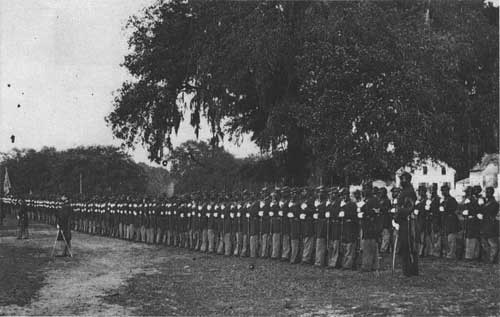
|
THE 1ST SOUTH CAROLINA VOLUNTEER'S INCLUDED THE FIRST UNIT OF FORMER
SLAVES TO BE MUSTERED INTO THE U.S. ARMY. (LC)
|
During the first fifteen months of the war, Lincoln certainly had
opportunities to permit black men to serve in the army. Manpower
shortages and abolitionist sympathies convinced several general officers
to advocate black enlistment, and a few of them actually overstepped
their authority and organized military units composed of African
Americans. Each time, the Lincoln administration rebuffed these
efforts.
The first scheme to arm black men occurred along the coastal islands
of South Carolina. When Acting Secretary of War Thomas A. Scott ordered
Brigadier General Thomas W. Sherman to head an expedition to seize the
area, he authorized Sherman to use the services of anyone, "fugitives
from labor or not, who offered it." He could employ them any way he saw
fit, as long as this was not "a general arming" for military service.
Sherman adhered strictly to the guidelines and did not use them for
military purposes. His successor, however, did not hesitate to place an
expansive spin on those instructions.
In late March 1862, Major General David Hunter, a West Point graduate
with antislavery leanings, succeeded Sherman to the command in South
Carolina. Deriving his authority from the orders given to his
predecessor, Hunter declared martial law and promptly emancipated all
slaves in Georgia, South Carolina, and Florida. Hunter brought in
escaped male slaves under gunpoint for a meeting. There he announced
plans to organize military units with fugitive blacks and made clear
that they were all volunteers. Such a harsh method of recruitment
alienated the local black population. Hunter than worsened the situation
by neglecting to inform the War Department of what he had done. The
Lincoln administration learned of Hunter's activities through newspaper
reports and Treasury Department correspondence.
Eventually, Lincoln could have sustained Hunter. In the Militia Act
of July 17, 1862, Congress empowered the president to organize African
Americans and use them "for any military or naval service for which they
may be found competent." Nevertheless, Lincoln elected not to endorse
Hunter's decisions. He believed that black enlistment was a delicate
issue, one that required careful planning and cautious execution.
Hunter's unauthorized foray into policy-making smacked of poor timing
and mismanagement.
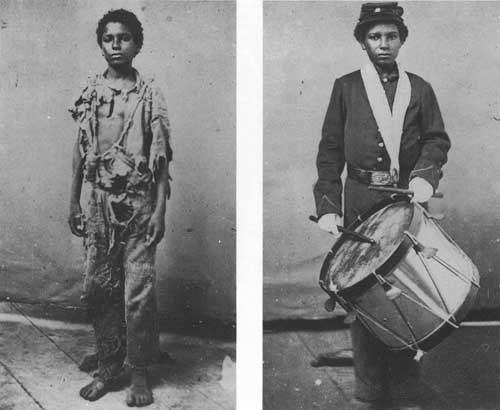
|
ON THE LEFT IS A PHOTOGRAPH OF A SLAVE NAMED JACKSON. ON THE RIGHT IS
JACKSON AS A DRUMMER IN THE UNITED STATES COLORED TROOP'S. (USAMHI)
|
At the heart of the second scheme to create a black regiment was U.S.
Senator Jim Lane, a diminutive yet tough-minded politician who concerned
himself more with results than rules. In 1862, Lane resigned his seat to
accept a commission as brigadier general, with the duty of recruiting
military units back home in Kansas. Among Lane's newly formed commands
was a regiment of black soldiers. Although Lane lacked specific
permission from the War Department to raise black units, he apparently
hoped that his political influence and the actual existence of such a
regiment would win governmental approval. He was wrong. Twice the War
Department notified him that he had no authorization to raise a black
regiment and must disband it immediately, and twice Lane simply ignored
the order. In January 1863, the Federal government finally accepted the
services of his black regiment, the 1st Kansas Volunteer Infantry
(Colored). By then, though, many of its troops had already seen
combat.
Louisiana, too, was scene of a bizarre episode of black recruitment.
After a joint army-navy expedition captured New Orleans in April 1862,
Benjamin Butler assumed command of the occupation forces. In Virginia,
Butler had acted boldly in the formation of his contraband policy. This
time, when a subordinate demanded that he organize black men into
regiments, Butler hesitated, and to the War Department he even voiced
doubts about the utility of black soldiers.
Brigadier General John W. Phelps, like Hunter a West Pointer and an
abolitionist, regarded black enlistment as a military and social
necessity. Blacks, Phelps argued, could offset the Federal manpower
shortage in Louisiana, and the structure and discipline of military
service would help to ease the transition from slavery to freedom once
Southern society collapsed. Ha welcomed and aided fugitive slaves in
their attempts to reach Union lines. Then, without authorization, he
organized the freedmen into five companies and requested arms and
accouterments for them.
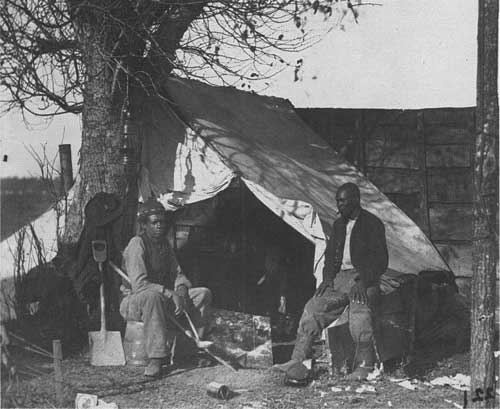
|
CONTRABANDS AT REST IN A UNION CAMP. (LC)
|
Butler, who had not yet learned of Phelps's activities, directed him
to employ the fugitives to assist in the preparation of defensive works
by cutting down trees and building fortifications. Phelps exploded in
fury. He would order black soldiers to perform such labors, but he would
not act as a "slave driver." Phelps then tendered his resignation and
requested an immediate leave of absence.
Only the president had the right to raise black military units,
Butler explained, and at present Lincoln declined to exercise that
authority. The fortifications were absolutely essential for their
defense, and the use of fugitive slaves for their construction was
standard practice. The government had drawn on black labor in other
theaters, and the men would receive pay for their work. Butler then
urged Phelps to withdraw his resignation.
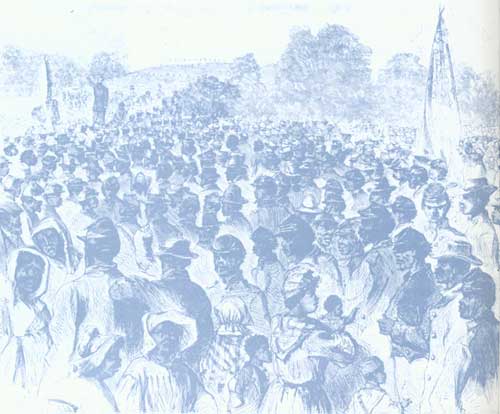
|
A SCENE IN LOUISIANA OF A UNION GENERAL ADDRESSING BLACKS ON THE DUTIES
OF FREEDOM. (HARPER'S WEEKLY)
|
Butler's words failed to soothe his subordinate's ire. The government
accepted Phelps's resignation.
A bizarre twist concluded the Phelps controversy. Just a few weeks
after he sent Phelps's resignation to Washington, Butler changed his
mind on black soldiers. In the intervening time, he had received a
letter from Secretary of the Treasury Salmon P. Chase. Conveying
sentiments that Lincoln had expressed in a cabinet meeting, Chase
suggested that the time was right for the formation of black regiments.
Since Butler desperately needed manpower and had initiated the
contraband policy, he was the logical person to enlist African Americans
in the army first.
Fortunately for Butler, he had the ideal recruits for the first black
regiments in some local militiamen. These were free blacks whose
ancestors had fought in the Battle of New Orleans in 1815. They were men
of considerable means, either skilled workers, professionals, or
entrepreneurs. When hostilities broke out, they volunteered to serve for
the Confederate government. With Federal occupation of New Orleans. they
had immediately tendered their services to Butler. In May 1862, he
declined their offer; three months later, fortified by Chase's
recommendation, Butler accepted these free black militia men into the
Union army, and the War Department promptly endorsed it.
What made the decision to accept them into the army even more
eventful was that Butler brought these militia units into Federal
service with their black officers. At one time the 1st, 2nd, and 3rd
Louisiana Native Guards (later 73rd, 74th, and 75th U.S. Colored
Infantry) all had black captains and lieutenants and one regiment, the
2nd Louisiana Native Guards, had a black major, Francis Dumas.
Shortly afterward, prominent abolitionist and Massachusetts infantry
captain Thomas Wentworth Higginson received authorization to recruit the
first black regiment from scratch. Higginson returned to the South
Carolina coastal islands, where Hunter had alienated so many freedmen
with his overbearing enlistment" methods, Painstakingly, Higginson won
over the local black men and formed the 1st South Carolina (Union)
Infantry (later 33rd U.S. Colored Infantry). Unlike the Louisiana Native
Guards, whites constituted the officer corps in the 1st South
Carolina.
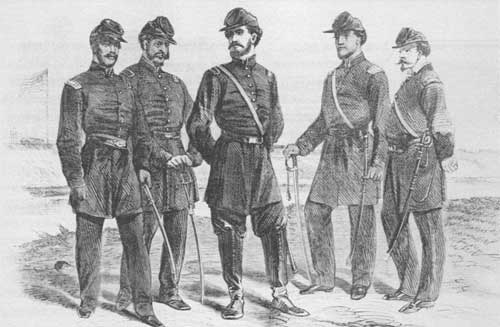
|
BLACK OFFICERS OF THE FIRST LOUISIANA NATIVE GUARDS. (FW)
|
Within the first six months of 1863, recruitment of numerous black
regiments was underway. The War Department finally accepted Lane's
regiment for official military service, and conscientious efforts to
form black units had progressed handsomely in Louisiana and Mississippi.
To the north, Massachusetts governor John A. Andrew successfully lobbied
the War Department for authorization to create a regiment composed of
free blacks. Again, all the officers were white.
|
|
